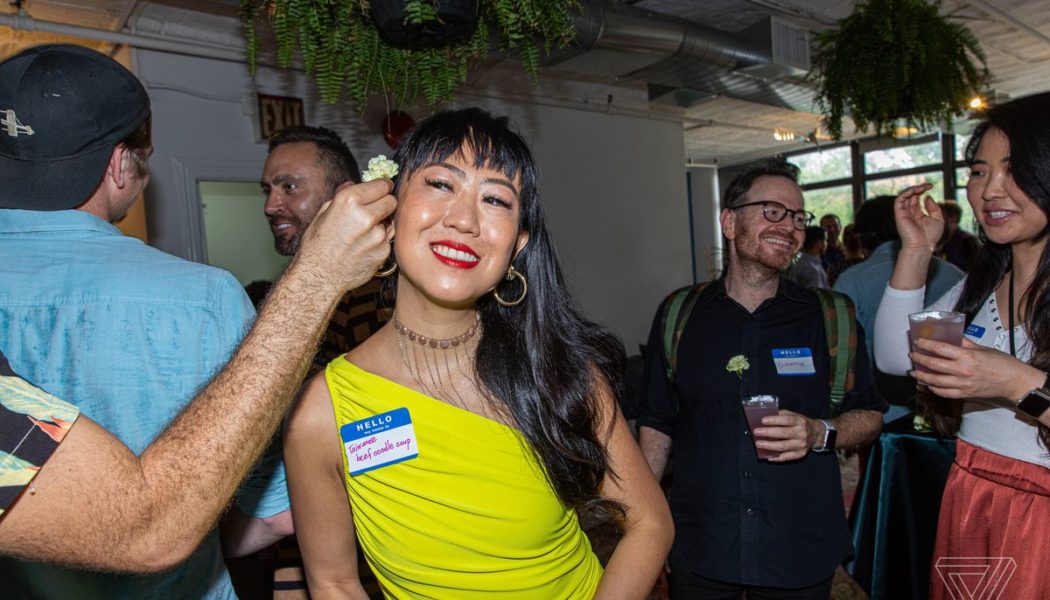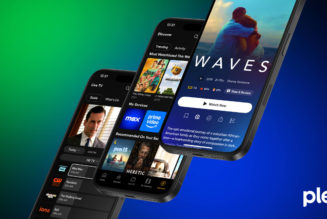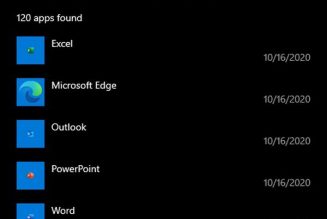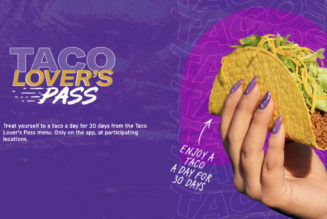During a normal week, Leiti Hsu dedicates at least one night to hosting her Dream Dinner Party. She hops on Clubhouse to interview guests, describing the food and atmosphere of her fictitious party as a gateway into deep, emotional conversations. Wagyu steak sizzles in front of you, she calls out, a massage table and masseuse sit on call for anyone who wants to take some time away from the (imaginary) table, she reminds you.
But last week, Hsu showed us what her Clubhouse room looks like when brought into the real world. Packed inside a New York City apartment, Hsu has brought in an actual masseuse, Tony Qin, to rub people down. A chef stands behind an island prepping “roving omakase,” like octopus salad and spicy tuna onigiri, along with various a la minute dishes. Tom Shpetner, aka Tom the Somm, aka the night’s sommelier, walks around pouring drinks. This party’s his first time back working the room, schmoozing with guests, and gushing about wine since the pandemic shut everything down.
Lisa Ann Markuson, a poet at Ars Poetica, is also available to write poetry on-demand, typed on a typewriter, for guests. “Poems on a cloud,” Markuson says, as she sits on a white fluffy cushion. She writes me a post-pandemic poem about coming out the other end of it: “nourished, healed, no need to hide.”
:no_upscale()/cdn.vox-cdn.com/uploads/chorus_asset/file/22663110/akrales_20210607_4616_0046.jpg)
:no_upscale()/cdn.vox-cdn.com/uploads/chorus_asset/file/22663118/akrales_20210607_4616_0294.jpg)
:no_upscale()/cdn.vox-cdn.com/uploads/chorus_asset/file/22665138/akrales_20210607_4616_0253.jpg)
This event could represent Clubhouse’s worst-case scenario: why would anyone tune in to an app when they could join in person and eat eggplant katsu with a bunch of cool, creative people? There’s already speculation that fewer users are logging in to Clubhouse regularly, and multiple people at the party tell me this is true — they’ve seen their room numbers drop.
The app’s future seems to be on everyone’s mind. Without prompting, one person launches into a defense of Clubhouse without me ever even asking about its problems. Another person tells me that “navel-gazing” about the platform’s future and how it’s doing is a “boring question,” which, interpret that as you will.
Hsu isn’t the first creator to make her Clubhouse rooms happen in person. Nicole Behnam of the Beyond club has hosted events in person in Los Angeles, while the Lullaby Club, a club with more than 45,000 followers, hosted its first in-person event in New York City in June. (Axel Mansoor, formerly the Clubhouse app icon and founder of the Lullaby Club is even in attendance at this party.) All these events clearly owe their attention and existence to Clubhouse, but the move to in person suggests a shift of sorts, away from the digital.
Whether the actual app numbers are waning or not, though, everyone here loves Clubhouse, if only for a chance to meet and get to know new people. The party comes off more like a reunion. The attendees had clearly already chatted, sang together, and shared their secrets on the app.
“It was just like, ‘Yep, I know who you are. You’re that same, silly person that I saw online,’” says an attendee.
The broader group tends to attribute this comfort to having heard each other’s voices first.
“If I met you on Clubhouse, and we had a heart-to-heart, or even if you heard me and I heard you, I’d remember your voice,” Kunal Sood, a Clubhouse creator with more than 35,000 followers tells me. “I feel like that’s what the app does, it gives you a feeling of wanting to be intimately connected.”
:no_upscale()/cdn.vox-cdn.com/uploads/chorus_asset/file/22663114/akrales_20210607_4616_0115.jpg)
:no_upscale()/cdn.vox-cdn.com/uploads/chorus_asset/file/22665111/akrales_20210607_4616_0139.jpg)
:no_upscale()/cdn.vox-cdn.com/uploads/chorus_asset/file/22663112/akrales_20210607_4616_0097.jpg)
And now they could actually, physically connect. Most of the attendees seem to consider themselves huggers, often going in for a hug, even with me, instead of a handshake. Everyone is constantly embracing and touching each other, putting their arms around one another’s shoulders, resting their heads on others’ shoulders. Contact all the time.
“I don’t like shaking hands now,” one attendee and Clubhouse user tells me. “I’ve been hugging people instead now.” “We’re all so touchy-feely,” another person says.
Instead of name tags, guests write their after-school snack of choice down on a sticker. Mine — mac and cheese — became my identifier and also my “safe word,” Hsu says, though I’m still not entirely clear where or when I’m supposed to use it.
Hsu reminds us of this rule after three hours of partying when everyone is instructed to take a seat on the floor around the DJ booth and some microphones. Guests sing, thanks to the presence of the Lullaby Club, and Hsu auctions off a coffee date with the Knicks’ physical therapist, who is at the party, as well as the founder of the period activist group Period.org. The date sells for $400, which Hsu says she’ll donate, along with ticket proceeds from the event, to the nonprofit Food for Soul.
But controlling an in-person crowd isn’t as easy as wrangling a group on the app. Hsu attempts to quiet everyone down, as do multiple party guests who take the mic, but they can’t stop everyone from talking and eating in their small groups. It’s a party, and there’s no mute button IRL.
Hosting in an apartment comes with its own complications, too. Hsu needed to find a physical space, food to dish out, and, broadly, be an attentive party host who wants people to enjoy their time while also not forcing them to quiet down and stop talking, which likely won’t go over in a room of talkers.
:no_upscale()/cdn.vox-cdn.com/uploads/chorus_asset/file/22665136/akrales_20210607_4616_0155.jpg)
:no_upscale()/cdn.vox-cdn.com/uploads/chorus_asset/file/22665135/akrales_20210607_4616_0050.jpg)
:no_upscale()/cdn.vox-cdn.com/uploads/chorus_asset/file/22663113/akrales_20210607_4616_0113.jpg)
“What I have been astonished by is just speaking things into existence, and on Clubhouse, you can do it to like hundreds or thousands of people,” Hsu says. “In real life, it takes a little bit of a different kind of effort to get 50 people in a room, but no matter what, it’s always speaking things into existence and [getting] the right people here, and their magic unfolds.”
Strangely, I consistently get the sense that these people — big Clubhouse users who are used to talking for hours on end — are panicking about what they say to me during this event, even though it’s never incriminating or even all that spicy. Someone tells me the app “changed their life.”
:no_upscale()/cdn.vox-cdn.com/uploads/chorus_asset/file/22663109/akrales_20210607_4616_0010.jpg)
Two Clubhouse creators, who seemingly pride themselves on honest, real, authentic conversation, worried after the event that I might quote them or actually print what they said, which suggested to me that they perhaps feel safer on the app, where conversations disappear, people aren’t supposed to record, and they control the space, despite much of this being true of the real world, too. Still, at this party, what you say might be remembered, repeated, or, if you’re standing in the presence of a journalist, written down.
They’re intensely loyal to the platform, though, with only some willing to admit to seeing cracks in Clubhouse’s buzzy facade. One person proudly tells me they haven’t logged in to Clubhouse in four months, but they believe if the app can make it through 2021, it’ll be here to stay. Another tells me multiple other platforms have reached out about signing exclusive deals, although they’re loyal to Clubhouse for now.
The following day, two creators message me to point out that Clubhouse numbers are popping off, and sure enough, they are. Rooms are reaching thousands of listeners, a rarity recently. The numbers recalibrate to the usual, lower reach the next day, but none of these people who’ve seen the numbers drop, or have even cut back on their time, seem worried. Clubhouse gave them a platform and place to connect with people. It’s not going anywhere for them.
As I listen to the live auction, I decide to head over to the massage table. Lying face down, I listen to guests name who they’d want at their dream dinner party, like Glenn Close, Issa Rae, and someone’s grandpa. I slightly drift off with the sound of the partygoers chatting in the background, similar to how I have in the app itself. But when my massage ends, and I realize it’s already nearly 11PM with a subway ride ahead of me, I can’t just close the app and immediately fall asleep. I instead make the rounds, saying goodbye to people I met, exchanging info and phone numbers. Maybe we’d meet up for drinks sometime soon, we say. But more likely, I’d catch them on the app, maybe raise my hand as a little hello, and then log off and go back to the real world.










